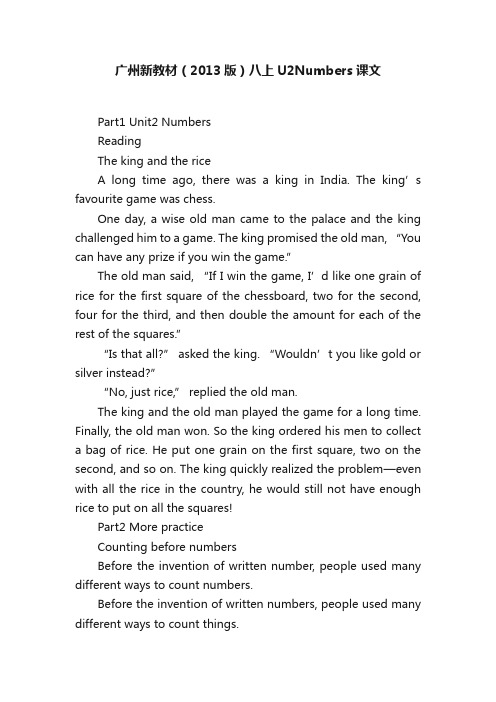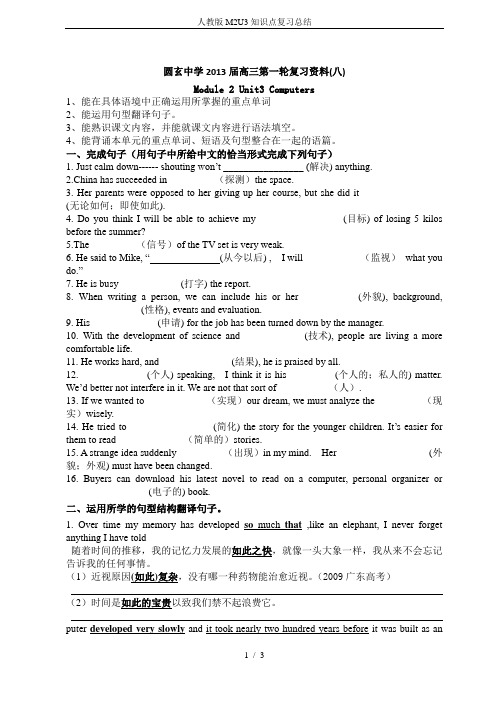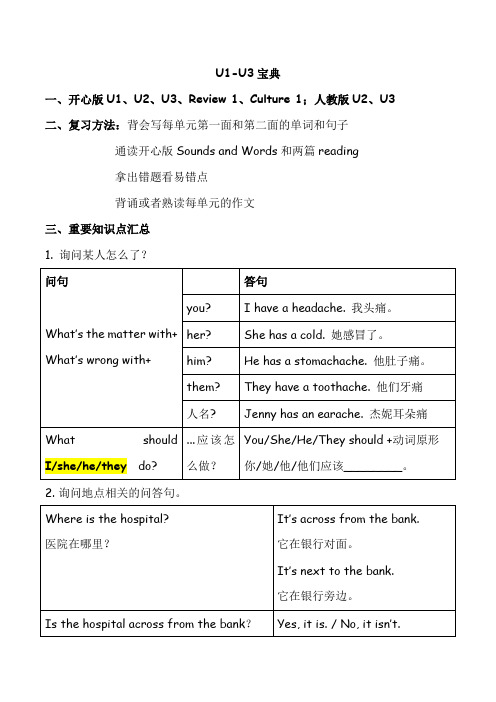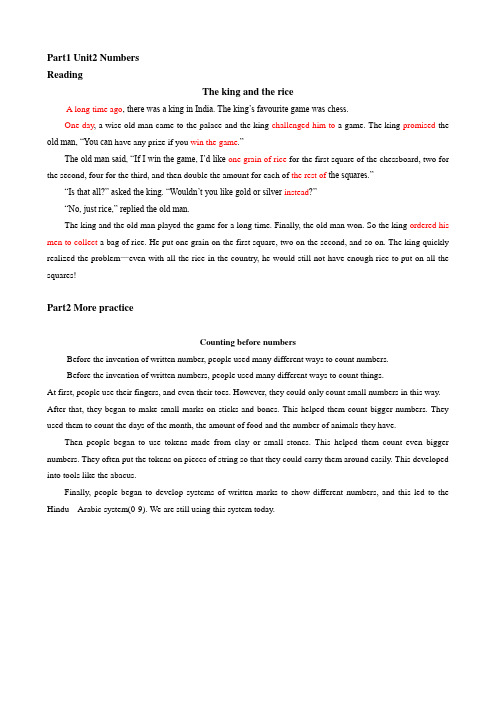2013春季广州英语新教材U2-U3复习
广州新教材(2013版)八上U2Numbers课文

广州新教材(2013版)八上U2Numbers课文Part1 Unit2 NumbersReadingThe king and the riceA long time ago, there was a king in India. The king’s favourite game was chess.One day, a wise old man came to the palace and the king challenged him to a game. The king promised the old man, “You can have any prize if you win the game.”The old man said, “If I win the game, I’d like one grain of rice for the first square of the chessboard, two for the second, four for the third, and then double the amount for each of the rest of the squares.”“Is that all?” asked the king. “Wouldn’t you like gold or silver instead?”“No, just rice,” replied the old man.The king and the old man played the game for a long time. Finally, the old man won. So the king ordered his men to collect a bag of rice. He put one grain on the first square, two on the second, and so on. The king quickly realized the problem—even with all the rice in the country, he would still not have enough rice to put on all the squares!Part2 More practiceCounting before numbersBefore the invention of written number, people used many different ways to count numbers.Before the invention of written numbers, people used many different ways to count things.At first, people use their fingers, and even their toes. However, they could only count small numbers in this way. After that, they began to make small marks on sticks and bones. This helped them count bigger numbers. They used them to count the days of the month, the amount of food and the number of animals they have.Then people began to use tokens made from clay or small stones. This helped them count even bigger numbers. They often put the tokens on pieces of string so that they could carry them around easily. This developed into tools like the abacus.Finally, people began to develop systems of written marks to show different numbers, and this led to the Hindu---Arabic system(0-9). We are still using this system today.。
2013届牛津英语第一轮复习课件Module3Unit2(2)

upon a time(很久以前),just now(刚才),in the old days(在
过去的日子里),before liberation(解放前……),When I was 8 years old(当我8岁时……),at (7 o'clock…)等。
18 April 2019
The train arrived ten minutes ago.
误:I was knowing the answer.
正:I knew the answer. 我知道答案。 误:I wasn't understanding him. 正:I didn't understand him.
我不明白他的意思。
18 April 2019
(3)过去进行时与一般过去时的区别 ①进行时表某一行为的“片断”,一般时表示行为 的“整体”和存在的状态。 I was reading the book at that time. (未读完,“读”
或某一段时间内正在进行或持续进行的动作。过
去进行时动词与always, continually, frequently 等词 连用时,表示明显的感情色彩。进行时与when连
用表达“正在做某事,突然……”的意思。短暂性
动作用于进行时时,表达“慢慢地”的意思。常 见时间状语有this time yesterday/last month/last year 等,表达“过去这个时候”的意思。
有一个过去的时间或动作来作参照,说明在此之前某动
作已发生或某状态已经存在。体会 “过去的过去”或 “从过去到过去”是理解过去完成时的关键。具体时间 状语有:by+过去时间或before+过去时间。
18 April 2019
2013届牛津英语第一轮复习课件 Module2 Unit3(2)

17.与名词易混的动词有: advise(v.), advice (n.); bathe(v.), bath(n.); breathe(v.), breath(n.); choose(v.), choice(n.); succeed(v.), success(n.)。
Module2·Unit 3 Amazing people(2)
December 5, 2020
(P.50)
December 5, 2020
动词和动词短语
一、动词的分类 根据意义和句法作用,英语动词可分为4类: 1.行为动词(实义动词) ①及物动词(带宾语):study, develop… ②不及物动词(不带宾语)work, swim, go, come… ③状态动词(相对静止)contain, exist, own, prefer, belong… ④动作动词 延续性(work, stay…);非延续性(marry, gDoe,cecmobemr 5e, 2…020)
December 5, 2020
二、易混动词归纳对比 1.lay(放), lie(躺)与lie(说谎):
中文 放 躺
说谎
原形 lay lid
过去分 现在 词 分词 laid laying
lain lying
lied lying
说明
及物动 词
不及物 动词 不及物 动词
2.系动词 ①表示人或事物的特征和状态:be, feel, look, seem, taste, appear, sound… ②表示状态的变化:turn, go, become, get, fall, grow… ③表示某种状态的延续或持续:remain, keep, stay… 3.助动词(与动词原形或分词构成复合谓语): be (am, is, are),do(does, did); have(has); will, would, shall… 4.情态动词:can(could),may(might), must, shall(should)…
人教版M2U3知识点复习总结

圆玄中学2013届高三第一轮复习资料(八)Module 2 Unit3 Computers1、能在具体语境中正确运用所掌握的重点单词2、能运用句型翻译句子。
3、能熟识课文内容,并能就课文内容进行语法填空。
4、能背诵本单元的重点单词、短语及句型整合在一起的语篇。
一、完成句子(用句子中所给中文的恰当形式完成下列句子)1. Just calm down------ shouting won’t ________________ (解决) anything.2.China has succeeded in _________(探测)the space.3. Her parents were opposed to her giving up her course, but she did it ________________ (无论如何;即使如此).4. Do you think I will be able to achieve my ________________ (目标) of losing 5 kilos before the summer?5.The _________(信号)of the TV set is very weak.6. He said to Mike, “______________(从今以后) , I will ___________(监视)what you do.”7. He is busy ____________(打字) the report.8. When writing a person, we can include his or her ___________(外貌), background, _______________(性格), events and evaluation.9. His _____________(申请) for the job has been turned down by the manager.10. With the development of science and ____________(技术), people are living a more comfortable life.11. He works hard, and ______________(结果), he is praised by all.12. _____________(个人) speaking, I think it is his _________(个人的;私人的) matter. We’d better not interfere in it. We are not that sort of __________(人).13. If we wanted to ____________(实现)our dream, we must analyze the _________(现实)wisely.14. He tried to ________________ (简化) the story for the younger children. It’s easier for them to read _____________(简单的)stories.15. A strange idea suddenly _________(出现)in my mind. Her ________________ (外貌;外观) must have been changed.16. Buyers can download his latest novel to read on a computer, personal organizer or ________________ (电子的) book.二、运用所学的句型结构翻译句子。
Unit1-3复习知识点(素材)粤人版英语六年级上册

U1-U3宝典一、开心版U1、U2、U3、Review 1、Culture 1;人教版U2、U3二、复习方法:背会写每单元第一面和第二面的单词和句子通读开心版Sounds and Words和两篇reading拿出错题看易错点背诵或者熟读每单元的作文三、重要知识点汇总1. 询问某人怎么了?2.询问地点相关的问答句。
3.询问食物相关问答句。
一般疑问句:Is junk food bad for us? Yes, it is.垃圾食品对我们有坏处吗?是的。
Is plenty of water good for me? Yes, it is.充足的水对我们有好处吗?是的。
Is there enough food for them? No, there isn’t.这里的食物对他们来说足够吗?不,这的不足够。
4.询问动物的种类。
What kind of animals are snakes? They are reptiles.(注意划横线的部分要用复数,fish(鱼类)除外)What animals do you like? I like monkeys. (注意划横线的部分用复数)What animals does he/she like? He/She likes monkeys.*重点:什么动物是什么种类的?它们是_____类动物。
5.询问国家与城市的问答句。
(1)Where do you want to go this winter vacation? 这个寒假你想去哪里?I want to go to + 城市/国家. 我想去_______。
What do you want to do there? 你想在那里做什么?I want to + 动词词组. 我想在那里_______。
询问第三人称时,注意以下的动词变化。
Where does he/she want to go this winter vacation? 这寒假他/她想去哪?He/She wants to go to + 城市/国家. 他/她想去_______。
广州新教材(2013版)八上U2Numbers课文

Part1 Unit2 NumbersReadingThe king and the riceA long time ago, there was a king in India. The king’s favourite game was chess.One day, a wise old man came to the palace and the king challenged him to a game. The king promised the old man, “You can have any prize if you win the game.”The old man said, “If I win the game, I’d like one grain of rice for the first square of the chessboard, two for the second, four for the third, and then double the amount for each of the rest of the squares.”“Is that all?” asked the king. “Wouldn’t you like gold or silver instead?”“No, just rice,” replied the old man.The king and the old man played the game for a long time. Finally, the old man won. So the king ordered his men to collect a bag of rice. He put one grain on the first square, two on the second, and so on. The king quickly realized the problem—even with all the rice in the country, he would still not have enough rice to put on all the squares!Part2 More practiceCounting before numbersBefore the invention of written number, people used many different ways to count numbers.Before the invention of written numbers, people used many different ways to count things.At first, people use their fingers, and even their toes. However, they could only count small numbers in this way. After that, they began to make small marks on sticks and bones. This helped them count bigger numbers. They used them to count the days of the month, the amount of food and the number of animals they have.Then people began to use tokens made from clay or small stones. This helped them count even bigger numbers. They often put the tokens on pieces of string so that they could carry them around easily. This developed into tools like the abacus.Finally, people began to develop systems of written marks to show different numbers, and this led to the Hindu---Arabic system(0-9). We are still using this system today.。
(完整)新广州版英语初二下U2_Body_language讲义与练习
教师:学生:年级:初二学科:英语总第____ 次月日U2 Body language一.学科特点:1、 take, spend, cost, pay 四个花take It takes sb/to do sth句:“ How long does it take⋯to do sth?”“How much does it take⋯to do sth? ”spend人 spend/on sth/(in) doing sthcost物 cost sbpay人pay for sth成立个花了他多少?How much did ______ ______ _______ ______ build this library?Tom 每日夜晚花两小达成作。
_______ _______ Tom two hours ________ _______ his homework every night.昨天我花了三小去滑雪。
We ________ three hours in ________ ________ yesterday.我和我父亲母亲花了一礼拜参湖南,那边很美丽。
My parents and I ________ one week _________ Hunan. It's very beautiful there.二.回首测评:三.内容体现:1.教课要点:能熟运用 U2 的短,并熟 U2 的拼写和意思。
2.教课难点:掌握名的用法。
3.教课内容:(1)课内知识:A、要点单词1、 communication n社交;交流拓展:v 交流is the most important tool in.语言是最重要的社交工具。
2、 accept v 接受(建议、邀请等)She offered him a lift and he it.她反义词:reject v 拒绝The chief editor his suggestion. 主编拒绝了他的建议。
(原创)2013届新课标高考英语一轮复习模块2 unit3课件
单词回顾
Ⅰ.写出下列必考单词 1.算术题,总数,金额 n. 2.(电脑)操作员,接线员 n. 3.人造的,假的 adj. 4.算盘n. 5.侄女,甥女n. 6.目标,目的n. 7.无论如何,即使如此adv. 8.病毒n. 9.类型,打字n.&v. 10.教练n. 11.网络,网状物n. 12.革命n. sum _______________ operator _______________ artificial _______________ abacus _______________ niece _______________ goal _______________ anyhow _______________ virus _______________ type _______________ coach _______________ network _______________ revolution _______________
答案:
1.intelligent
2.application; simplified
3.logic; logical ; illogical
4.Personally
5.universe
6.calculator; calculate; calculations
7.technological
重难点突破
2.What are the advantages and disadvantages of
each form of IT?(P22)
每种IT有何优点和缺点? ◆词语拓展 have an advantage of take advantage of be at an advantage work/be to one,s advantage 有……有利条件 利用,欺骗;占……便宜 处于优势 对某人有利
八年级英语上册Unit3复习(2013版新目标)英语课件PPT
I’m more outgoing than my sister.
Review
Free talk
Lily
Lucy
They are twins.
Lily is taller than Lucy.
Lucy is shorter than Lily.
2
shorter thinner smarter
A. more popular
B. most popular
C. popular
D. so popular
7. She bought much foodC the way home.
A. in
B. by
C. on
D. to
8. Although we discussed the plan, we didn’t agree
j. like to do the same things as me.
1. A friend in need is a friend indeed. 患难朋友才是真朋友.
2. A friend is easier lost than found. 朋友易失不易得。
TLalkeatbo’sut yroeu aandd yaoulrofriuendd !
with each otDher some ways.
A. at
B. on
C. by
D. in
9. The twins B lovely girls.
A. are all B. are both C. both are D. all are
10. This camera is B better than that one.
新三年级英语下U2,U3
U2 练习你的书我的牛奶想要禁止说话三间图书馆不能吃东西想要做上下走二、句型否定回答) ________________________否定句) ________________________________3. It’s my English book.(对划线部分提问) ____________________________4. It’s an old library.(否定句) _____________________________________1.不要吃我的蛋糕。
2.不要喝我的牛奶。
3.这是什么? 是一本英语本。
4.这是你的书吗?二U3 练习午饭盒在那边给你的谢谢你二、1、这是你的橡皮吗? 不,不是2、我的尺在哪儿?3、这支蜡笔是给你的,谢谢4、你的书包在哪里?在图书馆Isn’t(完整形式)___________this(对应词)__________ where is (缩写)______________here(对应词)__________ library(复数)________ ___ do not (缩写)___________ No,it is not(缩写2 种)______________ ______________你的铅笔盒______________ 我的书包______________ 那只午饭盒饭______________给你的______________ 在窗户旁边______________ 在地板上______________吃一日三餐______________、______________、______________ 在门旁边______________Bob has two big books____________________________ 这是给你的_______________________、_______________________ 它是什么_______________________ 在一楼_______________________四、句型1.This is my English teacher(改为一般疑问句) ___________________________________2.My ruler is on the floor(对划线部分提问) _______________________________________肯定回答、否定回答) _______________________________________改为一般疑问句、肯定回答、否定回答、否定句) _____________________________good___________this___________aunt____________white_____________no___________here____________ those______________ boy______________open______________。
- 1、下载文档前请自行甄别文档内容的完整性,平台不提供额外的编辑、内容补充、找答案等附加服务。
- 2、"仅部分预览"的文档,不可在线预览部分如存在完整性等问题,可反馈申请退款(可完整预览的文档不适用该条件!)。
- 3、如文档侵犯您的权益,请联系客服反馈,我们会尽快为您处理(人工客服工作时间:9:00-18:30)。
2013年春季班(初一级)Unit 2课内巩固一、重点短语be famous for________________ …的首都________________ be known as ________________ 西欧________________on the coast________________ 在海边________________ prefer to ________________ 与…不同________________ go shopping 去购物搭电梯________________ walk up________________ 走下楼梯________________ go on holiday________________ 去观光________________ department store ________________ 多年以来________________ be closed to________________ 由于…原因________________ at least________________ 最多;至多________________ 名胜________________二、完成句子1. 法国是一个有很多漂亮地方的国家。
France is a ______ ______ ______ ______ ______ .2. 中国的首都是北京。
Beijing is ______ ______ ______ ______.3. 在这里你将会发现很多名胜,比如埃菲尔铁塔。
Here you ______ ______ many famous ______ ______ ______ ______ ______ Eiffel ______.4. 如果你想玩得开心就去广州大学城。
GHEMC is the ______ ______ ______ if you want to enjoy yourself. 5. 广州是以花而闻名的。
Guangzhou ______ ______ ______ its flowers.6. 星期天的时候我更喜欢呆在家里。
I ______ ______ ______ at home ______ Sundays.7. 你可以试一下往这条路上边走。
You can ______ ______ ______ this street.8. 为什么不来我家一块学习呢?______ ______ ______ to my home and study with me?9. 多年以来,广州一直高速发展。
______ ______ ______, Guangzhou ______ ______ quickly all the time.10. 珠江是世界上最美丽的江河之一。
______ ______ ______ is ______ ______ ______ ______ ____________in the world.11. 你这个星期天准备去干什么?What do you ______ ______ ______ this Sunday?12. 由于安全原因,任何时候都不要把婴儿单独留在车上。
______ ______ ______, never leave the baby alone in the car.三、首字母填空。
1. It would be p______ if I can get 100 scores in the exam.2. Compared to big cities, I p______ to live in smaller ones.3. Our teacher told us to f______ our homework before class.4. The tower is so high that we have to climb many s______.5. I want to deliver the package to my friend but I don’t have hisa______.四、作文要求:用be famous for, prefer to, be different from, over the years 写一段话,不少于40个单词。
___________________________________________________________ ___________________________________________________________ ___________________________________________________________ ___________________________________________________________ ___________________________________________________________ ___________________________________________________________Unit 3课内巩固一、重点短语arrive at/in________________ 独自________________lead sb to ________________ 入睡________________wake up________________ 在某人的帮助人______________get down ________________ 在…旁边________________ fire engine ________________ 向某人道歉________________ look after________________ 在…的底部________________ as soon as________________ 踏上________________save one’s life ________________ 一些时间之后________________the sound of________________ 开始做某事________________二、完成句子1. 欢迎你前来,但我们禁止宠物进入。
You ______ ______ ______ stay, but we don’t _______ pets here.2. 接待员向John道歉并把他们带到房间里。
The _________ ________ to John and ______ them ______ the room. 3. 把你的卧室装扮成课室,你晚上就可以很快入睡了。
Decorate your bedroom to a classroom, and you’ll ______ ____________ ________ _______ soon at night.4. 最后,消防员把Charlie救出了建筑。
______, the fireman got Charlie ______ ______ the building.5. 烟开始从门下进来。
Smoke ______ ______ ______ from under the door.6. 在Michael的帮助下,Tom终于学会种树了。
______ Michael’s ______, Tom finally learned how to plant trees.7. 到广州之后记得给我打个电话。
________ to call me when you ______ ______ Guangzhou.8. 每天放学后我妈妈带我回家的。
My mum ______ ______ ______ after school every day.9. 每次感冒的时候大强都一直照顾我。
Daqiang ______ ______ me ______ ______ ______ when I am sick. 10. 当踏上长城那一刻,我就晕倒了。
I fell down to the ground when I ______ ______ the Great Wall.11. 大雄一开电脑就开始做功课。
Daxiong starts to do his homework ______ ______ ______ he turns on the computer.12. 星期一到星期五我们都得早醒来。
We need to ______ ______ early in the morning on weekday.三、首字母填空。
1. Jackson is b______ so he can’t see anything.2. What do you m______ by saying you hate me?3. Net bars do not a______ teenagers under 18 to come in.4. We need to a_______ when we do something bad.5. Computers are very h______. We can do a lot of things with them.四、用短语的适当形式填空。
1. Mum told me to ______________ my baby sister.2. As students, we shouldn’t _____________ in class.3. Please write down your name _____________ this card.4. Give me a call when you _____________ the park.5. Make sure that you _____________ the right way.6. My house is __________ to the school, so I usually walk there.7. __________ his father went out, the boy turned on the computer.8. Lucy broke my bike but she didn’t _____________ me.9. John __________ on the floor with Charlie because there was fire.10. We should do our homework _______________.。
